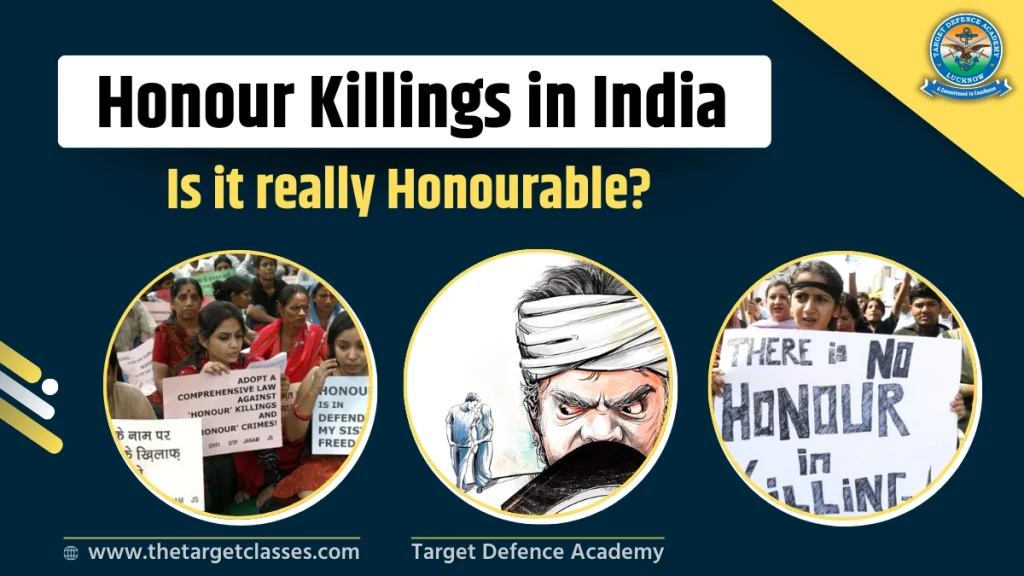Context
In India, caste is a deeply ingrained social system, and ‘honour’ killings are surfacing as a violent but socially sanctioned means to maintain caste hierarchies, particularly against inter-caste marriages.
About Honour Killings
(i) Definition: Honour killings are the killing of persons (young couples, in most cases) by community or family members. The excuses given for such murders are that they supposedly bring “dishonour” by indulging in relationships that violate caste, community, or gender norms.
(ii) Geographical Pattern: South indian states like Telangana, Maharashtra, and Kerala etc, where Dalits are empowered (edu, jobs, etc), record high rates of inter-caste marriages as well as high cases of such events.
(iii) Paradox: Violence is most visible where caste hierarchies are being challenged.
(iv) As per National Crime Records Bureau data, India recorded twenty-five cases of these incidents in both 2019 and 2020.

Reasons for Honour Killings
(i) Caste endogamy: Families act as gatekeepers of caste boundaries, and their lineage, land, and status restrict women’s will and choice.
(ii) Khap/community sanctions: Informal councils/kin networks encourage or legitimise violence or social boycotts.
(iii) Fear of Exclusion: Families who don’t conform to traditional marriage norms face pressure and fear from their communities.
(iv) Anonymity in social media: Social media emphasise caste pride and vigilante narratives, generalising punishment for non-compliance.
What are the Impacts?
(i) Constitutional rights: It violates Articles 14, 15, 19, and 21 of the Indian Constitution.
(ii) Gendered violence: It mostly targets women asserting choice; it also affects men from stigmatised castes/communities.
(iii) Erosion of the rule of law: When communities take the law into their own hands, it weakens the state’s authority to use force legally and also scares the police and witnesses from doing their duty.
(iv) Social fragmentation: It gives rise to sectarian (caste, religion) polarisation, hampers inter-group mobility and integration. All this eventually deteriorates social capital and the growth of all.
India’s Anti-Naxal Strategy 2025: Security, Development & Eradication Plan
Best NDA Coaching in Lucknow | Top Defence Coaching in Lucknow
Download the Mobile App of Target Defence Academy
Measures taken against Honour Killings
(i) There is no central law when it comes to honour killings; cases are investigated as murder/attempt, etc. Under IPC (now replaced by Bharat Nyaya Sanhita) and other laws, along with the SC/ST Atrocities Act, where applicable.
(ii) Law Commission (Report 242, in 2012) recommended a specific law to curb unlawful assemblies (Khap interference) in matrimonial choice.
(iii) The Rajasthan government in 2019 brought a law restricting interference with matrimonial alliances in the name of honour/tradition, notable for criminalising collective/community pressure.
Way Ahead
(i) Dedicated Legislation: Bring a law from the union side that criminalises honour killings and unwanted community interference. This should be based on the Law Commission recommendations and Rajasthan’s precedents.
(ii) Data & Monitoring: Ameliorate the national crime record bureau’s classification to catch all forms of honour crimes. It includes murder, abetment, threats, etc and with real-time reporting.
(iii) Protection & Rehabilitation: Establish district-level safe shelters, legal aid, counselling, as well as financial support for inter-caste and inter-faith couples.
Conclusion
India’s caste system is at a crossroads, evidenced by both violent reactions and strong democratic voices against honour killings. Tamil Nadu embodies this contradiction, presenting a potential hope for caste dissolution through acknowledgement, engagement, and digital counter-narratives. So, the entire country should imitate this model to get rid of such heinous crimes, which are disrupting the social order of the country.

